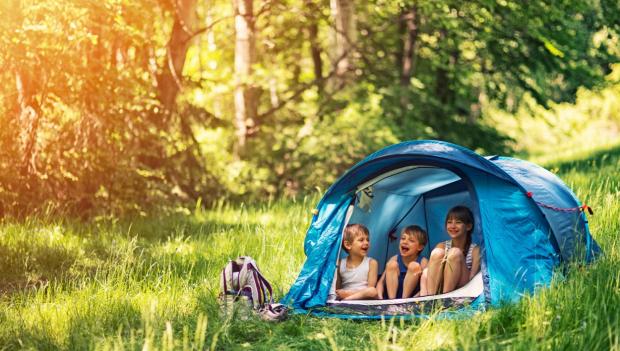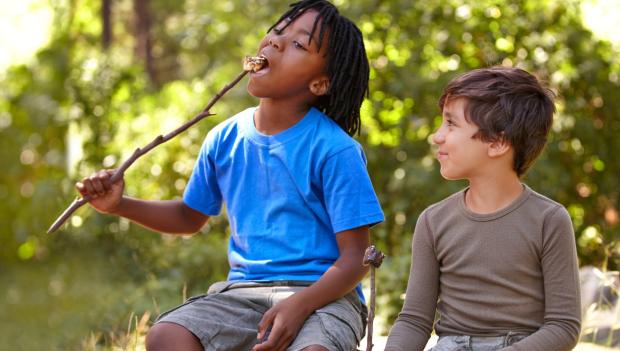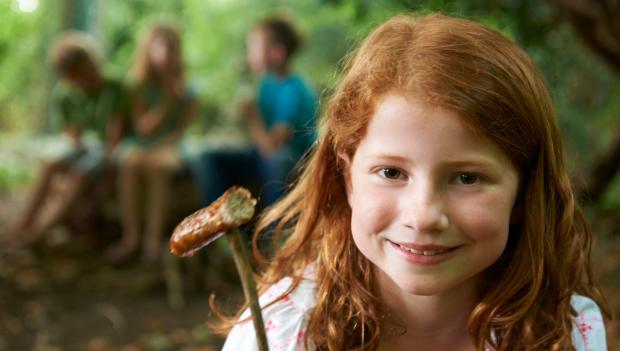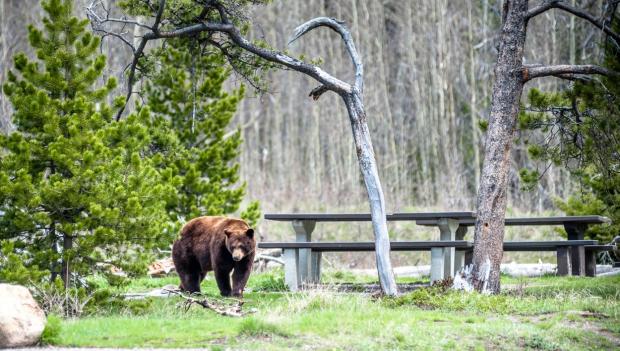Camping Safety Rules for Kids

Camping is a fun and challenging activity. Taking your kids camping is not just an adventure; it's also a chance to bond as a family and teach important lessons in an outdoor setting. Unlike a traditional classroom, however, the outdoor environment requires special safety considerations for kids. To keep everyone safe on your next family camping trip, follow these important camping safety rules.
The Top 20 Camping Safety Rules for Kids
1. Stay Together
Outside the immediate boundaries of the camp, children should follow the rule of twos. This includes going to the restrooms and showers in pairs. Remind young children of this rule and reinforce that if one of them gets hurt or if they find themselves in trouble, one buddy will be able to go for help.
2. Establish Boundaries
Whether you create your campsite footprint with markers like "past the picnic tables," or make a fence by attaching string to trees, it's important that kids know to stay within the boundaries of the campsite.
3. Stay Away from Water (Unless You're with an Adult)
As fun as it may seem to play in a stream or lake, children need to understand that an adult must always be present when they're near the water. Make sure to include plenty of water play time in the family schedule, so kids are less tempted to go alone when no one's looking.
4. Avoid Poison Ivy, Poison Oak & Poison Sumac
Parents and kids should learn to identify poison ivy, poison oak and poison sumac. Avoid them while exploring the outdoors, and wear long pants, socks and enclosed shoes in wooded areas. As an added precaution, remind kids to wash their hands frequently to avoid spreading the rash if they have accidentally come in contact with these irritating weeds.
5. Shoes at All Times
Though you may decide that flip-flops are okay when kids are inside the campsite, some kind of shoes should be worn at all times. Walking through the woods in bare feet puts kids in danger of stepping on rocks, thorns and poisonous plants.

Recommended: Top 10 Family-Friendly Hiking Trails in the West
6. Camp Tools Aren't Toys
Kids should stay away from camp tools like axes and knives, as well as any other equipment that is potentially dangerous or fragile. It can help to give them their own safe tools like pails and shovels, to keep restless hands busy. You might even ask them to do helpful tasks like digging a perimeter around the fire pit before making a campfire.
7. Do Your Camp Chores
There's a reason that chores fall into the "safety" category. Parents will have plenty of chores to do to set up camp and keep it going, and the best way to keep the kids out of trouble is to give them jobs of their own. Some chores, such as proper trash disposal, are also key to keeping the campsite safe.
8. Don't Eat Anything You Find in the Woods
Explain to your children that items such as berries, mushrooms and nuts they see in the forest aren't for picking and eating. Although they might look similar to their safe counterparts in the grocery store, items found in the woods could be poisonous to humans. And even if we see birds or other animals eating them, it's no guarantee that people can do so safely.
9. Drink Plenty of Water
Remind your children to carry their water bottles with them and refill them regularly. Being outside all day, and the sweat-inducing activities that come along with it, can deplete the water in our bodies.
10. Fuel Up with Healthy Foods
All kids need energy to be able to run, climb and play. In addition to hearty campsite meals, pack plenty of high-protein snacks such as peanut butter crackers, nuts, jerky and trail mix.

Recommended: 10 Reasons Why Kids Need to Spend Time Outdoors
11. Keep It Clean
The best way to keep animals away from the campsite is to make sure it's clean and litter-free. Kids will be happy to help if you explain that they're protecting the family by picking up food wrappers, dirty socks and shoes, empty cans and wet bathing suits.
12. No Food in the Tent
Not only is this rule about keeping things clean, but it's also about keeping away animals – especially bears! Explain to the children that bears and other wild animals have a very good sense of smell. Even if food is wrapped in a package, bears can still smell it in the tent.
13. Don't Leave the Marked Trail
This is a basic camp safety practice, and it's an important rule for children to learn early. Be sure to emphasize how easy it is to lose track of the marked path, even in the clear light of day.
14. Make Noise
This is probably the easiest rule for kids to follow! It's important to make some kind of noise when you're walking through the woods or hiking a trail, in order to warn nearby animals to stay away. You can also tie bells to little kids' shoelaces that will jingle when they walk. Chances are, they'll love 'em so much, they'll want to keep them on even after you get back home.
15. Never Try to Touch Wild Animals
Make sure your children know that they aren't allowed to pet any wild animals. Animals in the wild might be carrying disease, and even harmless-looking animals may defend themselves with sharp teeth and claws when approached by humans.

Recommended: The Ultimate Kid Summer Adventure Bucket List
16. Keep Pets on a Leash
Emphasize to kids that the family dog has to stay leashed for protection. He or she could get lost, or get into a fight with a wild animal.
17. Always Bring a Whistle & Flashlight
Pack several loud, lightweight whistles for kids to wear around their necks at all times. Also bring along several flashlights to be used at night. Make it fun – and increase the chances they'll carry their safety gear – by inviting kids to choose their own colors.
18. Learn Fire Safety Rules & Practice Them
Before you go camping, give your children age-appropriate lessons on fire safety. Make sure they know their fire safety rules by heart, and follow them at all times. Weenie roasts and sing-a-longs are great ways to enjoy a campfire at a distance, with supervision.
19. Don't Touch Lanterns, Stoves or Grills–They're Hot!
Children are naturally inquisitive, and they need to be told to stay away from camp equipment, including hot surfaces like lanterns, cook stoves and grills. Encourage little helpers to pitch in at mealtime by setting the table, instead.
20. No Fire or Candles in the Tent
Even the smallest flame can catch an entire tent on fire. Just like at home, make sure kids know not to play with matches, lighters or candles. Let them know the only lights allowed in the tent are flashlights.
Talk to Your Kids: Finally, children understand more than we give them credit for, and kids follow rules more willingly if they understand the reasons behind them. Be sure to take the time to explain the purpose of each camping rule to your kids. They'll feel more secure knowing what's expected of them, and you'll be able to relax and enjoy the adventure.
Are you ready for an outdoor adventure? Plan your camping trip!